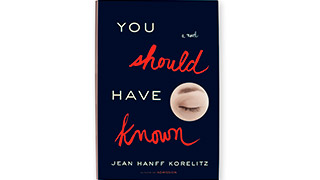Signs It's Time to Break Up With Your Best Friend
The author of the page-turning You Should Have Known explains how she knew when her
toughest relationship had ended—and why.
PAGE 3
Why did it take so long? I wonder now. Was it because she had been my
"best friend" for so long, because we had so much history, we had been
"through so much" together? Maybe I knew how important our long
friendship was to her, and worried that withdrawing from it would give her
new ammunition with which to beat up on herself. Maybe I was just
pathetic and weak, and took it for years because I couldn't stick up
for myself. Maybe all of this was true.
I'm a novelist by trade, but every one of us conjures a story for the people in our lives: his terrible childhood, her inability to trust, this child's yearning for stability. My narrative for Molly was that she was so encased in her own suffering that she truly did not experience her anger and need for control as real...but eventually a great and happy day would come when she would accept that she was all of the things I plainly saw—stunning and smart and talented and deserving of love—and how much happier and more at ease in her own life she would be then! I believed that for years. I persuaded myself of that for years.
Until, that day in San Francisco, when I found that I no longer had it in me to keep this fiction alive. I suppose these epiphanies happen all the time, to people everywhere. One moment, you're listening to the same internal justifications you've listened to countless times before; the next moment, you have passed through some unseen membrane, and from the other side you can suddenly hear yourself think—with crystal clarity: Oh, I understand. I'm done.
For months afterward, I talked about Molly incessantly, compulsively, with people who had known us both and with people who'd never met her. Did I do the right thing? I asked everyone. What should I have done? I wish I'd known, while it was actually happening on that San Francisco sidewalk, that I'd be okay, that I'd slowly move forward in my life with other friends, some of whom had never met or even heard of Molly. That I'd celebrate my 25th wedding anniversary without her, and she—I suppose—would do the same without me. That a few months later, I'd be able to see the entire arc of our friendship, from its beginnings through its trials to its conclusion, and with that perspective would come a return of the vast affection I had always felt for her.
Even now, I truly and sincerely want her to be successful, fulfilled and surrounded by people who love her as much as I loved her, but who are also better equipped to tolerate what I had not been able to tolerate. Sometimes, old friends and family members ask me if I miss Molly, and the answer is yes, I miss her very much. But I don't miss the friendship. I don't miss the friendship at all.
 Jean Hanff Korelitz is the author of You Should Have Known, The White Rose and Admission.
Jean Hanff Korelitz is the author of You Should Have Known, The White Rose and Admission.
I'm a novelist by trade, but every one of us conjures a story for the people in our lives: his terrible childhood, her inability to trust, this child's yearning for stability. My narrative for Molly was that she was so encased in her own suffering that she truly did not experience her anger and need for control as real...but eventually a great and happy day would come when she would accept that she was all of the things I plainly saw—stunning and smart and talented and deserving of love—and how much happier and more at ease in her own life she would be then! I believed that for years. I persuaded myself of that for years.
Until, that day in San Francisco, when I found that I no longer had it in me to keep this fiction alive. I suppose these epiphanies happen all the time, to people everywhere. One moment, you're listening to the same internal justifications you've listened to countless times before; the next moment, you have passed through some unseen membrane, and from the other side you can suddenly hear yourself think—with crystal clarity: Oh, I understand. I'm done.
For months afterward, I talked about Molly incessantly, compulsively, with people who had known us both and with people who'd never met her. Did I do the right thing? I asked everyone. What should I have done? I wish I'd known, while it was actually happening on that San Francisco sidewalk, that I'd be okay, that I'd slowly move forward in my life with other friends, some of whom had never met or even heard of Molly. That I'd celebrate my 25th wedding anniversary without her, and she—I suppose—would do the same without me. That a few months later, I'd be able to see the entire arc of our friendship, from its beginnings through its trials to its conclusion, and with that perspective would come a return of the vast affection I had always felt for her.
Even now, I truly and sincerely want her to be successful, fulfilled and surrounded by people who love her as much as I loved her, but who are also better equipped to tolerate what I had not been able to tolerate. Sometimes, old friends and family members ask me if I miss Molly, and the answer is yes, I miss her very much. But I don't miss the friendship. I don't miss the friendship at all.
 Jean Hanff Korelitz is the author of You Should Have Known, The White Rose and Admission.
Jean Hanff Korelitz is the author of You Should Have Known, The White Rose and Admission.



